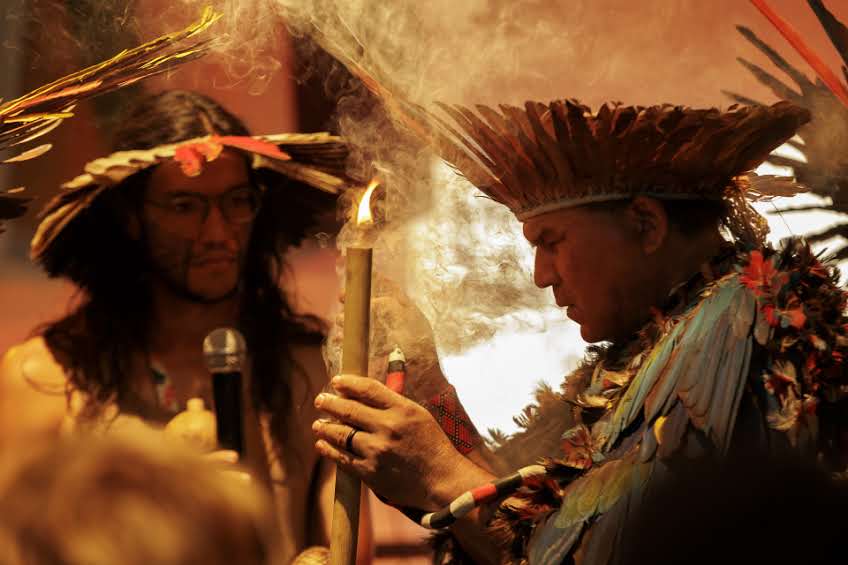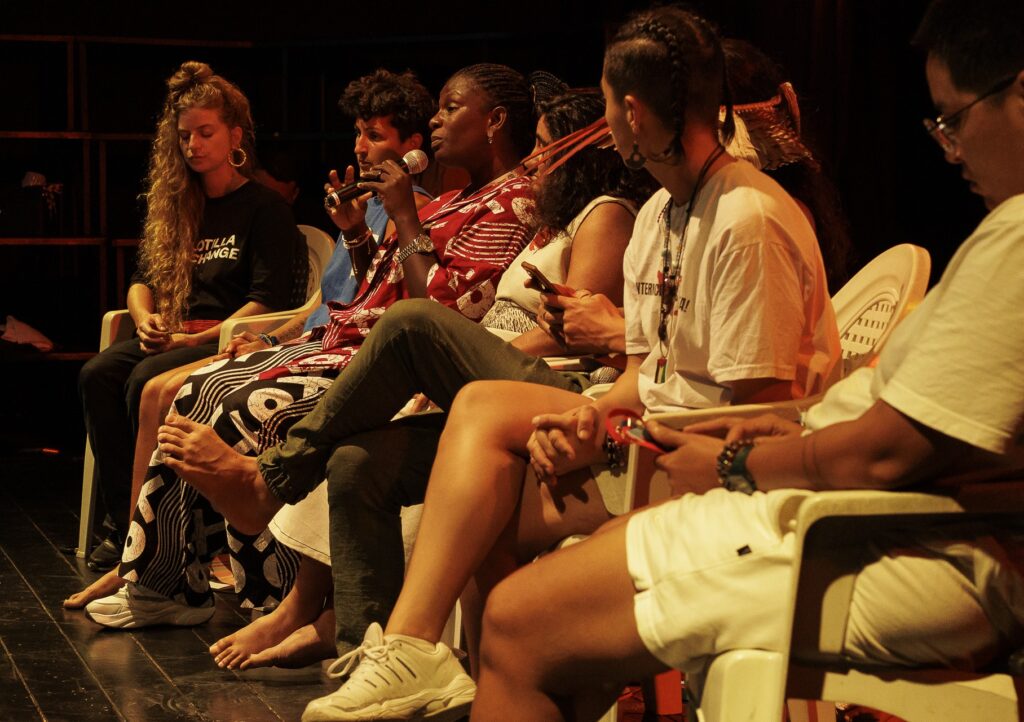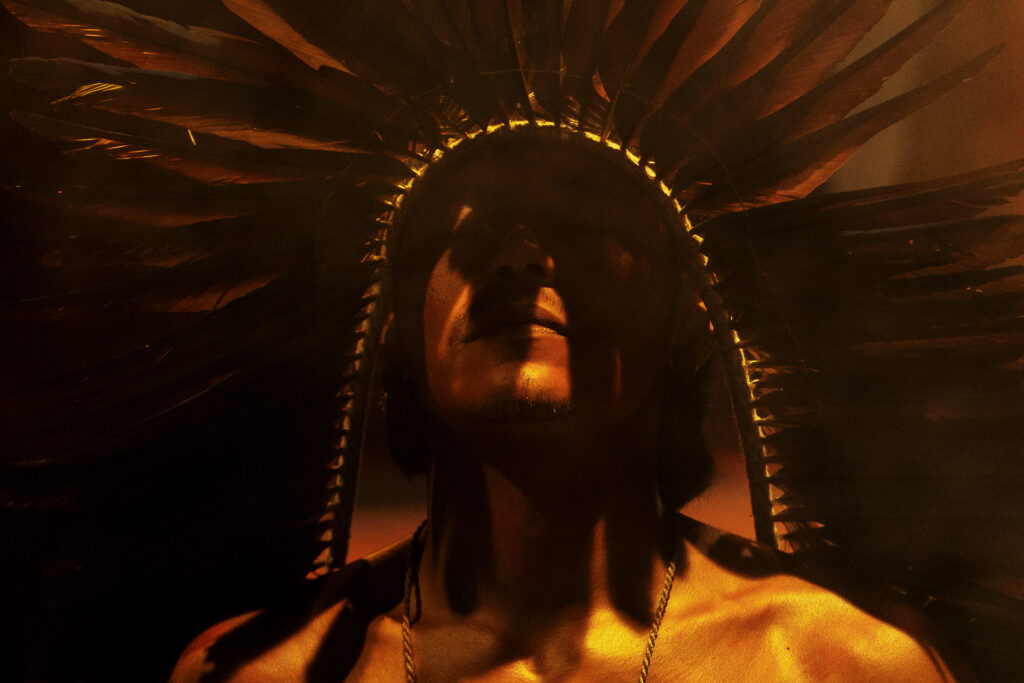
A summary of the participants at our event. Portuguese translation below.
Photos: Diego Bariviella
Paje Nato Tupinamba spoke and held a ceremony to open the event.
He is an indigenous spiritual leader, activist, and midwife who lives in the Alter do Chão region of Santarém, Pará state, Brazil. He is recognized for his work defending indigenous territories, maintaining shamanic traditions and practices, and also for his work as a massage therapist and spiritual healer.
Speakers: Suane Barreirinhas, Estefanía Narváez, Jyoti Fernandes, Melody Gold Barry-Yobo, Karina Ponton. Music from Ruth Costa and band.
Thank you also to Jessie May Green, Pedro Salvador, Paje Nato Tupinamba, Isabel Rogers, Maryano Maya, Diego Bariviella.Our speakers were:
Suane Barreirinhas
Belem local, Suane says ‘I am Suane Barreirinhas, a Black woman from Pará, an audiovisual filmmaker, and an enthusiast for building a new political landscape with Black, Indigenous, and Amazonian women taking power in Brazil.
I am a human rights activist, primarily defending children and adolescents, and I am a “political busybody,” producing content for my networks focused on visibility for candidates and reflection on electoral campaigns.’
Suane is leading a project to build a sustainable stilt house -the Vila da Barca Memorial Museum– featuring local history and art, a restaurant to train and employ local women, and a hostel.
Estefanía Narváez is media coordinator for the The World Forum of Fisher Peoples (WFFP) which is a mass-based social movement of small-scale fisher people from across the world.
In October, the Panamanian government closed Isla Escudo de Veraguas an ancestral fishing ground for the Ngöbe-Buglé, who are a community of 2 indigenous groups, reliant on the island for food and livelihoods. The closure was in the name of sustainability, yet the Ngöbe-Buglé people use their ancestral method of fishing by diving and using traps. Estefania campaigns for the rights of indigenous fisher people such as Ngöbe-Buglé to be restored.
Jyoti Fernandes is an international representative of La Via Campesina. Her work connects peasant farmers across the globe in a united effort to bring about food sovereignty and indigenous land rights.
Jyoti owns Fivepenny Farm in Dorset where she hosts fabulous parties as well as The Land Skills Hub as part of Landworkers Alliance, which connects a young, diverse farming network across the South West of England for knowledge exchange. She is a manifester of community all over the globe and a tireless activist.
Melody Gold Barry-Yobo is an Environmental Justice Activist, Climate Education and SDGs development and knowledge facilitator; Peace and Gender Activist, Poet & Leadership Mentor from Bari, Ogoniland, Nigeria. Melody was part of the Sababa crew and endured a long journey of sea-sickness across the Atlantic to get to COP30.
‘I represent the voices of the marginalized, oppressed, and indigenous people of Ogoni, who have suffered from exploitation and environmental pollution caused by large corporations like SHELL.
At COP 30, I demand accountability and transparency from world leaders, particularly those in the global north, to ensure that climate finance is effectively managed. I insist that oil must remain in the ground, and we reject new fossil fuel projects in Ogoni and the Niger Delta region. When oil flows, the soil bleeds.’
Karina Ponton finished her main role as a Woodland Adviser for the Farming and Wildlife Advisory Group. She has taken some time to explore some other interests during the past two years – including travel, managing Flotilla4Change, writing a book (wish her luck!) and learning to sail – across the Atlantic – with dozens of scientists, activists and politicians – to speak up for indigenous and marginalised communities affected by climate change, biodiversity loss and ocean acidification.
Translator Maryano Maya – Maryano is an Indigenous Brazilian cultural producer and translator who supports leaders and communities in sharing their stories. His work centers on Indigenous rights and environmental justice. His voice works as a bridge maker, creating connections across the original peoples of Abya Yala.
Thank you Ruth Costa and band for our Samba dance party!!!!
Ruth is a black singer, cultural producer and activist from Belém, Pará, Amazon
Creator of @sambadaruth
Her music weaves activism and art to strengthen the voices and power of the black and indigenous communities in Belem. Samba Da Ruth connects women from Para and Bahia together to empower with music.
Thank you Suane and everyone at Casa Da Linguagem for hosting us and everyone that came along. It was a tender and beautiful night of powerful stories that created huge inspiration for us as activists to continue campaigning and shout loudly, no matter what happens.
This event was made by Jessie May Green, Pedro Salvador and Karina Ponton.
—————————————————————–
We are fundraising for the hole in our boat which creates a great debt for Flotilla4Change and a barrier to the continuation of our project. We have so many plans:
-Create a flotilla to COP31 so more activists can travel sustainably and according to their ideals
-Continue to stand in solidarity with indigenous and marginalized people most affected by climate change, offering sailing as transport and collaboration.
-Normalise sailing as transport (Long term aim)
-Provide sailing resources like captains, boats and crew for environmental justice missions – collaborating with partners and friends we have made at COP30
Portuguese translation below. Thank you Pedro Salvador

Tradução para o português abaixo. Obrigado, Pedro Salvador.
Fotos: Diego Baravelli
Paje Nato Tupinamba discursou e realizou uma cerimônia para abrir o evento.
Ele é um líder espiritual indígena, ativista e parteiro que vive na região do Alter do Chão, em Santarém, estado do Pará, Brasil. É reconhecido por seu trabalho em defesa de territórios indígenas, manutenção de tradições e práticas xamânicas, e também por seu trabalho como massoterapeuta e curandeiro espiritual.
Nossos palestrantes foram:
Suane Barreirinhas
Moradora de Belém, Suane diz: “Sou Suane Barreirinhas, uma mulher negra do Pará, cineasta audiovisual e entusiasta da construção de um novo cenário político com mulheres negras, indígenas e amazônicas assumindo o poder no Brasil.”
Sou ativista de direitos humanos, defendendo principalmente crianças e adolescentes, e sou uma “intrometida política”, produzindo conteúdo para minhas redes focado em dar visibilidade a candidatos e refletir sobre campanhas eleitorais.
Suane lidera um projeto para construir uma casa sobre palafitas sustentável – o Museu Memorial Vila da Barca – que apresentará história e arte locais, um restaurante para capacitar e empregar mulheres da região e um albergue.
Estefanía Narváez é coordenadora de mídia do Fórum Mundial dos Povos Pescadores (WFFP), um movimento social de massa de pescadores artesanais de todo o mundo.
Em outubro, o governo panamenho fechou a Ilha Escudo de Veraguas, uma área de pesca ancestral do povo Ngöbe-Buglé, uma comunidade de dois grupos indígenas que dependem da ilha para alimentação e sustento. O fechamento foi justificado em nome da sustentabilidade, embora o povo Ngöbe-Buglé utilize seu método ancestral de pesca, mergulhando e usando armadilhas. Estefania luta pela restauração dos direitos de povos indígenas pescadores, como os Ngöbe-Buglé.
Jyoti Fernandes é representante internacional da Via Campesina. Seu trabalho conecta pequenos agricultores do mundo todo em um esforço conjunto para alcançar a soberania alimentar e os direitos territoriais indígenas.
Jyoti é proprietária da Fivepenny Farm em Dorset, onde organiza festas fabulosas, além de ser do The Land Skills Hub, parte da Landworkers Alliance, que conecta uma rede jovem e diversificada de agricultores no sudoeste da Inglaterra para a troca de conhecimento. Ela é uma defensora da comunidade em todo o mundo e uma ativista incansável.
Melody Gold Barry-Yobo é ativista da justiça ambiental, facilitadora de educação climática e desenvolvimento e conhecimento dos ODS; ativista da paz e da igualdade de gênero, poeta e mentora de liderança de Bari, Ogoniland, Nigéria. Melody fez parte da tripulação do Sababa e enfrentou uma longa jornada de enjoo marítimo pelo Atlântico para chegar à COP30.
“Eu represento as vozes dos povos marginalizados, oprimidos e indígenas de Ogoni, que sofreram com a exploração e a poluição ambiental causadas por grandes corporações como a Shell.”
Na COP 30, exijo responsabilidade e transparência dos líderes mundiais, particularmente daqueles do hemisfério norte, para garantir que o financiamento climático seja gerenciado de forma eficaz. Insisto que o petróleo deve permanecer no subsolo e rejeitamos novos projetos de combustíveis fósseis em Ogoni e na região do Delta do Níger. Quando o petróleo flui, o solo sangra.”
Karina Ponton encerrou sua principal função como Assessora Florestal do Grupo Consultivo de Agricultura e Vida Selvagem. Ela dedicou algum tempo nos últimos dois anos para explorar outros interesses, incluindo viagens, gestão da Flotilla4Change, escrita de um livro (desejamos-lhe sorte!) e aprendizado de vela – através do Atlântico – com dezenas de cientistas, ativistas e políticos – para defender as comunidades indígenas e marginalizadas afetadas pelas mudanças climáticas, perda de biodiversidade e acidificação dos oceanos.
Tradutor Maryano Maya – Maryano é um produtor cultural e tradutor indígena brasileiro que apoia líderes e comunidades no compartilhamento de suas histórias. Seu trabalho se concentra nos direitos indígenas e na justiça ambiental, e sua voz atua como uma ponte, criando conexões entre os povos originários de Abya Yala.
Obrigada Ruth Costa e banda pela nossa festa de samba!
Ruth é uma cantora negra, produtora cultural e ativista de Belém, Pará, Amazônia.
Criadora do @sambadaruth
Sua música entrelaça ativismo e arte para fortalecer as vozes e o poder das comunidades negras e indígenas de Belém. O Samba da Ruth conecta mulheres do Pará e da Bahia para empoderá-las através da música.
Obrigada Suane e a todos da Casa da Linguagem do Curro Velho por nos receberem e a todos que compareceram. Foi uma noite terna e linda, repleta de histórias poderosas que nos inspiraram muito como ativistas a continuar lutando e a gritar alto, não importa o que aconteça.
Este evento foi criado por Jessie-May Green, Pedro Salvador e Karina Ponton.
—————————————
Estamos arrecadando fundos para o conserto do nosso barco, que gerou uma grande dívida para a Flotilla4Change e representa um obstáculo para a continuidade do nosso projeto. https://www.crowdfunder.co.uk/p/save-flotilla4change-repair-a-broken-heart-hull
Temos muitos planos:
– Criar uma flotilha para a COP31 para que mais pessoas possam participar ativamente.
– Continuar a demonstrar solidariedade com os povos indígenas e marginalizados mais afetados pelas mudanças climáticas, oferecendo a vela como meio de transporte e colaboração.
– Normalizar a vela como meio de transporte (objetivo a longo prazo)
– Fornecer recursos para a prática da vela, como capitães, barcos e tripulação, para missões de justiça ambiental, em colaboração com parceiros e amigos que fizemos na COP30.

